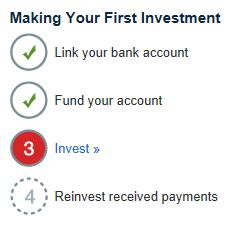Archive
LendingClub Payments Received

"Dollars and Cents" by posterize on freedigitalphotos.net
I have received payments on 4 of my notes and they have all been on time so far. I have not invested fully yet because I wanted to wait until a few rounds of payments came through before I continued. Let me reiterate at this time that notes priced higher than their remaining principal should not be bought unless you are sure you want to take that chance. Read up on the mistake that I made, which could cost me 3% on the principal of my purchased notes right of the bat.
As of right now my loan status is as follows:
- In Funding (0)
- Issued & Current (11)
- Late 16 – 30 Days (0)
- Late 31 – 120 Days (0)
- Fully Paid (0)
- Default (0)
- Charged Off (0)
I’ll get into percentages later when there is actually something worth while to report on! My thoughts right now on this lending platform is mixed. It seems like a really good way to help other people and make a bit of money by way of interest payments. I guess I am anxious because I already got blindsided right off the bat. It was my own fault of course.
We’ll see what happens as time progresses.
Should You Invest in the Stock Market?

"Traders" by Vlado on freedigitalphotos.net
Every young professional wants to be in the stock market and there isn’t much of a barrier to entry. Brokerages make the application process easy on purpose since their profits come from volume. They don’t care if you make or lose money, just that you trade a lot so they get their fees!
1 – Not a Game
The stock market is not a game like Monopoly where there are set rules. I don’t view the stock market as any type of game at all. You’ll hear talking heads on television use terms like “gaming” a market, but all that is ridiculous. If you jump in with the mindset that you’re playing a game like at a casino, you are going to lose all of your money. That brings me to the next poing.
2 – Don’t Go All In
You should only invest amounts of money that you are able to lose without a negative impact to your future. Another way to say this is that you should only invest what you can afford to lose. Each person’s definition of what they can afford to lose is different.
3 – Know Your Term
Do you want to be a short term trader or a long term investor? Each type of stock market participant has a different set of research that they have to do. In general, short term stock traders look at fundamentals as a side note, while long term investors are heavily swayed by fundamentals. On the flip side, shot term stock traders generally look for technical cues, while long term investors look at technicals as a side note. In other words, short term traders think strong fundamentals are nice, but focus on technicals and news flows. Long term stock investors think technical support is nice, but focus on the fundamentals of a company. Most of us should be in the long term camp. I don’t care how nimble you think your trading skills are. If you don’t know the tricks of the trade, you will be at a disadvantage. Short term trading also requires a lot of time and attention so if you don’t have a job and are willing to learn, you might have a shot. If you hold a full time job like I do, please think twice about being a short term stock trader.
4 – No Emotions
Check your emotions at the door when you enter the stock market. Emotions make people buy high and sell low. They see a stock skyrocketing so they want to catch the wave. Most of the time that happens to be close to the top. On the flip side, they see a stock trending down so they want to limit their losses. Most of th etime that happens to be close to the low! The right way to do it is to set levels and valuations that you are comfortable with and you have to have knowledge to do that. You have to look at balance sheets, cash flows, listen to conference calls, and the like. You cannot watch some TV, read some articles, and decide to invest in a particular stock. Guess what, that is another form of following your emotions. Emotions are just bad news when it comes to the stock market. View the talking heads on TV are nothing more than salesmen.
5 – Diversify
Do not put all your money into one stock. Listen, I know that it is hard not to look at a stock that is ramping higher and not jump on board. All it takes is one news event to take stocks down hard. Say you invested a fifth of your money in one of those high flyers, a fifth in a stable consumer staple with a dividend, a fifth in an energy stock, another fifth in a technology stock, and your last fifth in a retail stock. Your portfolio is now diversified and won’t be hit as hard if some bad news comes out about your high flying stock. It would take something like a recession to hit all 5 of those sectors at once and we just experienced one.
The bottom line is that consistency in the stock market requires a lot of time and effort. If you are okay with 1 or 2 hours a day of research for each stock you own or want to buy, then you can check that box off. You also have to be like a robot and not hit the buy or sell butons because of your roller coaster emotions. You need to have conviction in your decisions and learn from all mistakes. You need to only invest money that you can afford to lose.
I’ll be following up with a post about how to start and set up an online brokerage account. If you think you are ready, then please subscribe to receive an e-mail when my next article is posted.
Unemployment and Complacency

"Job and Man" by krishnan on freedigitalphotos.net
I read an article today on CNBC about how unemployment is expected to fall in the United States through 2012. This got me to start thinking about one of those ideas that the talking heads on television allude to every once in awhile. If you read that article and believe what it says, then all of the “experts” expect unemployment to fall and consequently job growth. The current reports that we are seeing don’t point to this at all. I started thinking about what would happen if unemployment stayed high and why it may not fall as predicted.
No Spike Up
First off, with all the government stimulus that has happened, I don’t believe there will be a spike in unemployment. That doesn’t mean that lackluster job creation can’t continue. A double dip recession doesn’t look to be in the cards, but that doesn’t mean we have growth ahead. What if we kept getting tepid employment numbers month after month. How long would it take for people to get tired of waiting for growth to resume as if it was a sure thing? What if people have found a way to live off of unemployment checks and no longer see a reason to find a job?
Main Street
It feels like a lot of the stimulus made its way into Wall Street, and only a small portion made it into Main Street. I don’t think it is any surprise that people were heavily involved in the bond market. The United States government was supporting that entire market! At the same time, the stock market was rallying and I believe that is because stimulus money was flowing from bond markets into the stock markets. The next crucial step of the cycle is for all the wealth building that occured in Wall Street to shift to Main Street. What if people just want to hoard their money and stay in those markets instead of supporting the economy by spending?
So?
What if all the factors stated above line up? What if the events that everyone thinks is going to happen don’t happen? Remember, the events that we don’t prepare for because we don’t see it coming are the most dangerous. I am not an economist or a market analyst so I can’t predict what may happen. If the perfect storm arrives, I believe the equity markets should trade in a range until the Federal Reserve raises interest rates. At that time the equity markets should slowly decend in an orderly fashion as people pull their money out and put it into savings. If the employment picture ever becomes brighter, then we’ll be able to take all this off the table. The United States government could, at any time, start some kind of employment boosting program. I will be watching these monthly employment reports very closely. I sure hope the lackluster numbers don’t continue.
LendingClub Trading Alert

"Man Looking at Loss" by digitalart on freedigitalphotos.net
As I do more and more research in the LendingClub trading platform operated by Folio, it seems riskier and riskier. The notes trade very similar to bonds and if you aren’t knowledgable on bonds and how they are priced, then you can lose a lot of money. Let me try to explain one pitfall that I see for the average person out there that thinks they’re doing something similar to lending if they buy a note.
Principal
The “principal” is the base amount of money that the borrower borrows. This value is one of two basic parts of every note. The other part will be covered further down. A portion of every payment that a borrower makes goes to the principal of the note. If a borrower pays more than the minimum payment, the extra amount all goes to paying the principal. This brings me to point #1, if the borrow pays the loan off early then you will miss out on future interest. This is not a huge problem if you are an original lender since you are promised to get your principal back. This is a huge problem if you are a buyer of a note that has been priced above its outstanding principal. More on this later.
Interest
The “interest” is the extra amount of money that a borrower pays for the privilege of getting a loan. It depends on the loan’s interest rate, which depends on many other factors such as the borrower’s credit worthiness. The interest portion of a note is not guaranteed. The only way you get the full amount is if the borrower pays every month through full life of the loan. If the borrower pays the loan off earlier, then you miss out on all interest that hasn’t been paid.
Danger
Here is the danger when you are buying notes on the trading platform. If you buy a note at a price that is higher than the outstanding principal left on that note, then you have more to worry about than the loan defaulting. You also have to worry about the borrower paying the loan off early! We all know we lose money if a loan defaults. I am not going to explain defaults here. I do want you to pay close attention to the outstanding principal on notes and make sure you want to take the risk of paying more than what’s left.
Say you see a note for a loan that originated at 15% and the borrower has been paying the loan off on time for a year. You may be tempted to purchase the note at a premium and still be able to receive a perceived 13% return if all goes well. Chances are that you will be paying 2-3% more than the outstanding principal left on the note. These are not exact numbers, but they’re close to how it works. If the borrower decides to pay the loan off in full the next month, you’ve lost 2-3% on your investment.
I would suggest that you purchase notes that are selling at a discount or as close to par as possible. Keep in mind that there is probably a good reason that a note is selling at a discount so do your research!
LendingClub Notes Purchased

- Screenshot from lendingclub.com
Oh yeah! I purchased my first few notes today after scouring the available notes for hours upon hours. My fund transfer finally completed and I was surprised to see a few extra cents in my account. Apparently LendingClub debits less than a dollar from your bank account to confirm that the account is yours. You enter the amount you see on their website and then your bank account becomes linked. They deposit the money back though!
There really weren’t that many notes on the trading platform that I was interested in. I have extremely particular requirements, though they are subject to change as I learn more about the market that I am in. There was a moment, towards the middle of my research, where I decided to open up some of the most grossly delinquent loans just to see what their descriptions looked like. I had pictured bad spelling, little information, and high revolving debt amounts. I was horrified to see that many of them would have been the types of notes that I would have invested in!
All it takes for someone with great credit to default on a loan is job loss or an unexpected emergency. For example, I saw a note where the borrower had a few thousand dollars in recurring debt, a $6,000 a month confirmed salary, and a LendingClub loan payment of $300 a month. Under normal circumstances, a 5% payment would be easy. This note is now multiple months late and a collection agency has taken over. Needless to say, this note was listed at pennies on the dollar and I wouldn’t touch it with a 10 foot pole.
In true engineering form, I made a spreadsheet of the notes that I purchased today. If all goes well and there are no defaults, my percentage gain will be 9.4%. That is just slightly off the 9.6% average that LendingClub advertises.
I’ll go into the strategies that I am using once I become more invested. Right now I am only slightly invested and am mostly still in cash.